Internet Stats (How Many Internet Users Are There?)
The internet is a weird and wonderful place. If you want to learn more about it, you’ll love our roundup of mind-boggling internet stats!
In this post, we’ll be revealing some truly astonishing facts and statistics about the internet, and shedding light on interesting questions like:
- How many people use the internet?
- How do people access the internet?
- What’s the average internet speed?
Plus many, many more.
We’ll start with an overview of our favorite stats, and then take a deep dive into all the most recent data to see what we can learn from it.
Ready? Let’s get started!
Internet statistics (top picks)
- The internet contains over 5 million terabytes of data
- Over 5.3 billion people use the internet, globally
- The global internet penetration rate is around 66%
- The internet contains 1.1 billion websites…
- …and over 650 million registered domains
- The average internet user spends 6 hours 37 minutes online
- 92.3% of internet users connect through their mobile, while 65.6% connect through their desktop or tablet.
- The average internet download speed is 67.25 Mbps on fixed line broadband, or 30.78 Mbps on mobile broadband
- Google is the most popular website on the internet with 8.13 billion unique visitors
How big is the internet?
According to the best estimations currently available, there are over 5 million terabytes of data on the internet (around 5 billion gigabytes).
To put that into perspective, Google has, so far, only indexed 200 terabytes of data—that’s less than 0.004% of the internet.
Of course, data isn’t the only thing we can look at to get an idea of the true size and scale of the internet. So with that in mind, let’s take a look at some other metrics.
How many internet users are there?
There are over 5.3 billion internet users worldwide, which is around 66% of the total global population.

That’s according to estimations from 2022 per the ITU, which is likely to be the most accurate and reliable source out there.
Estimations from other sources vary but are in a similar ballpark. For example, DataReportal’s latest Digital 2023 report claims there were 5.16 billion internet users at the start of 2023. And Internet World Stats has the figure at around 5.54 billion.
How many websites are there on the internet?
There are over 1.1 billion websites on the internet, of which around 199 million are still active. Around 157,000 new websites are created every day.
And that’s just full websites—there are many, many more website pages on the internet.
In fact, there are a mind-boggling 788 billion web pages archived by the Internet Archive, and counting!
How many domains are there on the internet?
There are over 650 million registered domains on the internet, as of the time of writing. Of these, over 129 million are registered in the US, which is vastly more than any other country
Around 37% of domains use the .com extension, making this the most common TLD online. There are over 240 million .com domains at the time of writing.
Sources: Internet World Stats, ITU, DataReportal, Colorlib, Easy Tech Junkie, Internet Archive, Domain Name Stat
Internet growth statistics
Now that we know how big the internet is, let’s look at some internet stats that tell us how fast it’s growing.
How fast is the internet growing?
Internet users are growing at an annual rate of 1.9% globally, according to DataReportal’s Digital 2023 report. However, the growth rate is much faster in developing economies.
Over the last decade alone (2012 – 2022), the number of internet users has more than doubled; increasing from 2.4 billion (34% of the global population) to 5.3 billion (66% of the global population)
Number of internet users by year
The graph below shows how the number of internet users has changed over time (according to historical data from ITU).
| Year | Internet users | % of total population |
| 2022 | 5.3 billion | 66% |
| 2021 | 4.9 billion | 63% |
| 2020 | 4.7 billion | 60% |
| 2019 | 4.2 billion | 54% |
| 2018 | 3.7 billion | 49% |
| 2017 | 3.4 billion | 46% |
| 2016 | 3.2 billion | 43% |
| 2015 | 3 billion | 41% |
| 2014 | 2.7 billion | 38% |
| 2013 | 2.6 billion | 36% |
| 2012 | 2.4 billion | 34% |
| 2011 | 2.2 billion | 31% |
| 2010 | 2 billion | 29% |
| 2009 | 1.8 billion | 26% |
| 2008 | 1.6 billion | 23% |
| 2007 | 1.4 billion | 21% |
| 2006 | 1.1 billion | 18% |
| 2005 | 1 billion | 16% |
What happens every minute on the internet?
Here are some more mind-boggling stats that reveal just how fast the internet is expanding with new content.
Every single minute on the internet:
- 109 websites go live
- 720 minutes of audio are uploaded to SoundCloud
- 2460 Reddit comments are made
- 2760 Spotify tracks are uploaded
- 6960 blog posts are published
- 30,000 minutes of YouTube videos are uploaded
- 66,000 photos are shared on Instagram
- 104,600 hours are spent in Zoom meetings
- 443,000 US dollars are spent on Amazon
- 347,200 Tweets are sent out
- 1 million hours of video are streamed
- 1.7 million hours of Facebook content is shared
- 5.9 million Google searches are made
- 90.2 million US dollars is spent on cryptocurrency
- 231.4 million emails are sent
Sources: DataReportal, Spectralplex, Statista1, Colorlib
Internet usage around the world
Next, let’s look at some statistics about internet usage in different countries and regions worldwide.
How many internet users are there in the US?
There are over 297.3 million internet users in the US, which is around 88.5% of the population. That’s according to data from Internet World Stats from 2022.
Internet usage by region
The table below shows the number of internet users in different geographical regions around the world, as well as the growth of internet users over time.
| Country | Internet users | Internet user growth (2000 – 2023) |
| Asia | 2.9 billion | 2452% |
| Europe | 747.2 million | 611% |
| Africa | 601.9 million | 13233% |
| Latin America / Caribbean | 534.5 million | 2858% |
| North America | 347.9 million | 222% |
| Middle East | 206.8 million | 6194% |
| Oceania / Australia | 30.5 million | 301% |
As you can see, Asia is the region with the highest number of internet users. This is largely due to the fact that Asia also has the largest population; it’s home to more than half of all people on earth.
As we’ll see shortly, despite its high number of internet users, Asia actually has one of the lowest internet penetration rates.
Africa has the fastest-growing number of internet users due to its developing economy.
Sources: Internet World Stats2, Internet World Stats3
Internet penetration rate stats
Internet penetration rate is a metric that tells us the percentage of a region’s population using the internet.
The global internet penetration rate is 64.4%, but varies dramatically between countries and age ranges.
For example, Data Reportal reports that the internet penetration rate is 78.3% amongst urban populations, while within rural populations, it’s just 45.8%.
Let’s take a closer look at the stats to find out more.
Internet penetration rate by age (US)
In the US, internet penetration rates vary substantially across age groups, with older age groups lagging substantially behind when it comes to internet adoption.
The vast majority (96-99%) of those aged 18-64 regularly use the internet, compared to just 75% of those aged 65+.
| Age | Share of internet users (% of the population) |
| 18 to 29 | 99% |
| 30 to 49 | 98% |
| 50 to 64 | 96% |
| 65+ | 75% |
Internet penetration rate by region
North America has the highest internet penetration rate of any geographical region at around 93.4%. Europe is a close second at 89.2%.
On the other end of the spectrum, Africa has the lowest penetration rate of any geographical region at just 43.2%. Less than half the population of Africa is online.
The graph below shows a complete breakdown of internet penetration by region, ranked in order from highest to lowest.
| Country | Penetration rate |
| North America | 93.4% |
| Europe | 89.2% |
| Latin America / Caribbean | 80.5% |
| Middle East | 77.1% |
| Oceania / Australia | 70.1% |
| Asia | 67% |
| Africa | 43.2% |
Internet penetration rate by country
Kurait has the highest internet penetration rate of any country at 99.6%.
Qatar, Falkland Islands, Bermuda, and Iceland also top the charts with penetration rates of over 99%.
North Korea is one of the countries with the lowest penetration rate at just 0.1%. Many countries across Africa also rank low on the list.
The US has a penetration rate of 88.5%.
Sources: Statista2, DataReportal, Internet World Stats4, Internet World Stats5, Internet World Stats3
How long do we spend on the internet?
According to data from January 2023, the average internet user spends around 6 hours and 37 minutes online. Adding all of the world’s internet users together works out as around 12.5 trillion hours of online activity.
Interestingly, the average time spent online this year is down by 4.8% (20 minutes) compared to 12 months prior.
This may have something to do with the global coronavirus pandemic. During the pandemic, national lockdowns meant many people spent more time online. But as we move further away from the pandemic and the world returns to normal, people are beginning to spend less time on their screens and more time outdoors.
Bonus fact: Of the 6 hours and 37 minutes we spend online, 2 hours and 31 minutes are spent on social media. Check out our roundup of social media stats to learn more.
Sources: DataReportal
How do people access the internet?
92.3% of the world’s internet users access the internet via their mobile devices. And in total, mobile phones account for around 60% of the world’s web traffic, and 57% of online time.
In comparison, only 65.6% of the world’s internet users access the internet via their desktop computers or tablets.
This shift towards mobile internet browsing reflects a wider shift towards smaller screens that has become apparent over the last decade. In the early days of the internet, most internet usage happened on desktops. But now, mobile is king.
What’s the most popular OS used to access the internet?
The most popular OS used to access the internet is Android. According to data from Statcounter, around 43% of all analyzed pageviews over the past 12 months (at the time of writing) happened via Android devices, which is more than any other operating system.
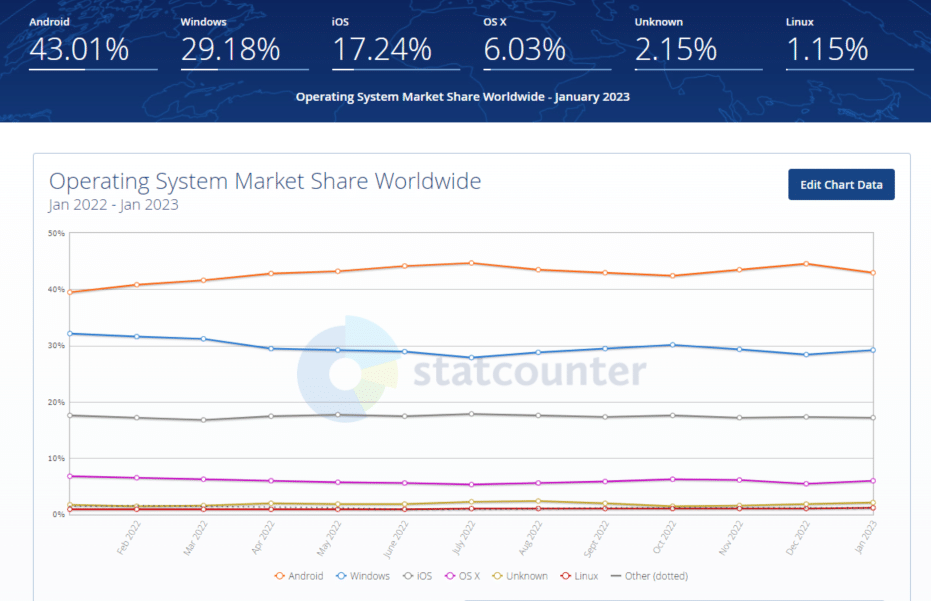
Most popular OS used to browse the internet by traffic share:
- Android – 43.01%
- Windows – 29.18%
- iOS – 17.24%
- OS X – 6.03%
- Unknown – 2.15%
- Linux – 1.15%
What’s the most popular mobile internet browser?
Chrome is the most popular mobile internet browser, by a wide margin, with over 65% of the market share. That makes it more popular than every other mobile internet browser combined.
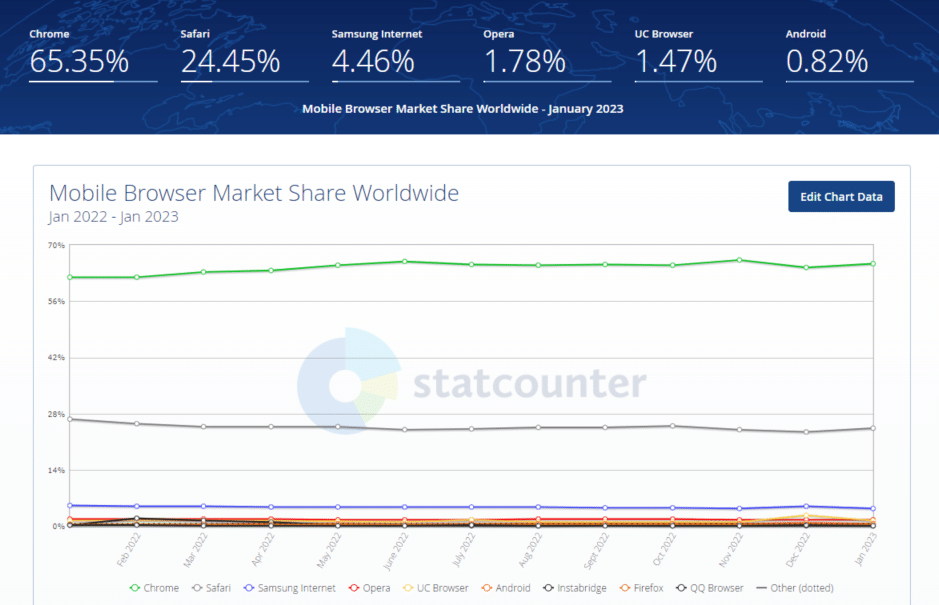
Part of the reason for Chrome’s popularity may be that it is the default browser on most Android devices. And as we discussed above, most internet traffic happens on Android.
Top 5 internet browsers by market share (mobile):
- Chrome – 65.35%
- Safari – 24.45%
- Samsung Internet – 4.46%
- Opera – 1.78%
- UC Browser – 1.47%
What’s the most popular internet search engine?
Google is by far the most popular internet search engine. It dominates the competition with over 92% of the market share. Bing trails in a distant second place with just over 3% of the market share.
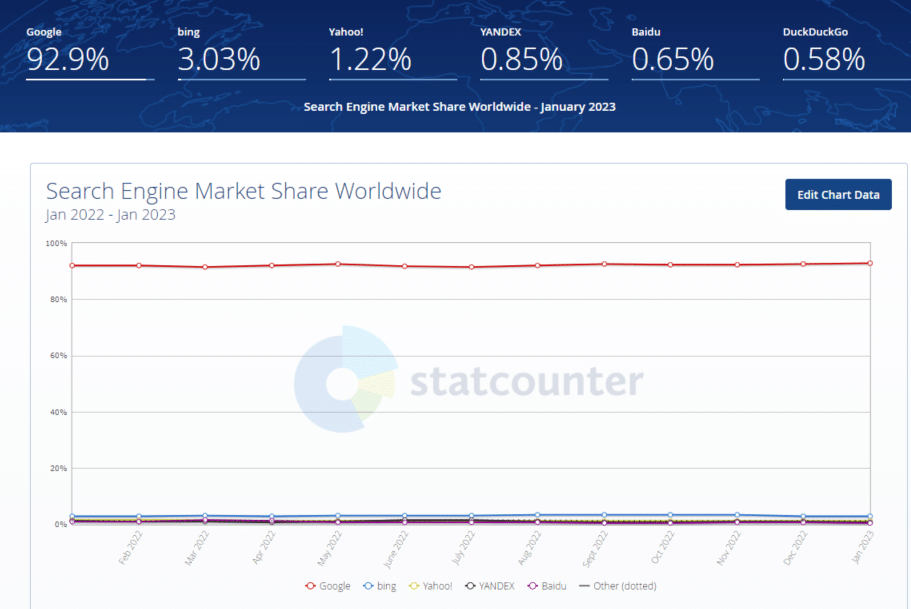
Top 6 internet search engines by market share:
- Google – 92.9%
- Bing – 3.3%
- Yahoo – 1.22%
- Yandex – 0.85%
- Baidu – 0.65%
- DuckDuckGo – 0.58%
Sources: DataReportal, Statcounter1, Statcounter2, Statcounter3
Internet ecommerce stats
Next, we’ll look at some internet stats about ecommerce and online shopping.
What percentage of people shop on the internet?
According to DataReportal, 57.6% of us purchase something online every month. That includes both goods and services.
How much money do we spend on the internet?
Total ecommerce sales reached around 5.2 trillion USD in 2021. To put that into perspective, that’s more than the economy of India.
Sources: DataReportal
Internet connection statistics
Next, we’ll look at some internet stats that tell us more about the different ways users connect to the internet worldwide.
Mobile broadband vs fixed line broadband
There are two main ways that users connect to the internet: via mobile broadband or via fixed line broadband.
The statistics suggest that mobile broadband is the most common kind of internet connection.
There are roughly 83.2 mobile broadband subscriptions for every 100 people, globally. In comparison, there are only around 16.7 fixed-line broadband subscriptions for every 100 people, globally.
Fixed broadband usage by region
Internet connectivity varies substantially by geographical area. The table below shows the number of fixed broadband connections for every 100 people in different regions worldwide.
| Region | Number of fixed broadband connections per 100 people |
| Worldwide | 16.7 |
| Europe | 34.7 |
| Americas | 23.4 |
| CIS | 20.3 |
| Asia & Pacific | 16.7 |
| Arab States | 9.4 |
| Africa | 0.6 |
As is shown above, Europe has more fixed broadband connections as a percentage of the population than any other region, likely due to its developed infrastructure.
Mobile broadband subscriptions by region
The table below shows the number of mobile broadband subscriptions for every 100 people in different regions around the world.
| Region | Number of mobile broadband subscriptions per 100 people |
| Worldwide | 83.2 |
| Europe | 105.3 |
| Americas | 103.3 |
| CIS | 94.1 |
| Asia & Pacific | 86.6 |
| Arab States | 66.9 |
| Africa | 40.7 |
As this shows, mobile broadband connections are much more prevalent in developing economies than fixed-line connections.
In all regions except for Africa, mobile broadband subscriptions exceed half of the population. And Europe and the Americas have more mobile subscriptions than people.
What is the average internet speed?
The average internet speed depends on whether we look at mobile or fixed-line connections.
Globally, the average fixed broadband download speed is 67.25 Mbps, and the average fixed broadband upload speed is 28.5 Mbps.In comparison, the average mobile broadband download speed is 30.78 Mbps, and the average mobile upload speed is 8.55 Mbps. This suggests that fixed-line connections are typically much faster than mobile connections.
Related: Site Speed Stats (How Fast Should a Website Load?)
Internet speeds also vary from region to region. The table below shows the top 10 countries with the fastest fixed broadband speeds
| Country | Average fixed broadband speed (Mbps) |
| Chile | 212.98 |
| Singapore | 211.36 |
| Thailand | 189.14 |
| China | 176.93 |
| Hong Kong | 176.59 |
| Macau | 160.32 |
| US | 159.31 |
| Denmark | 150.52 |
| Japan | 131.49 |
| New Zealand | 127.88 |
And the table below shows the top 10 countries with the fastest mobile internet speeds
| Country | Average mobile internet speed (Mbps) |
| Norway | 126.94 |
| UAE | 126.85 |
| Qatar | 124.29 |
| China | 116.42 |
| Netherlands | 105.52 |
| Denmark | 105.4 |
| South Korea | 104.81 |
| Bulgaria | 103.9 |
| Saudi Arabia | 97.15 |
| Kuwait | 95.05 |
Sources: Statista3, Statista4, Statista5
Interesting internet facts
Before we wrap up, here are a few facts about the internet that might interest you.
When was the internet invented?
The internet as we know it today didn’t take shape until January 1, 1983. This is widely considered to be the day the internet was invented.
However, the conceptual foundation that the internet is built on has much earlier roots.
As early as the 1950s, researchers and visionaries considered how information technology might evolve into something like the internet.
Then in 1957, cold war tensions spurred a technological race that lead to the creation of ARPANET in 1969, a limited communications network that would eventually evolve into what we now call the internet.
It wasn’t until around 1990 that use of the internet truly exploded. And the US Government didn’t transfer internet management to independent organizations until 1995.
What’s the most popular site on the internet?
Google is the most popular website on the internet, with more total monthly visitors and more unique visitors than any other site.
Top 10 most popular websites on the internet (by unique visitors):
- Google – 8.13 billion
- YouTube – 5.85 billion
- Facebook – 2.48 billion
- Pornhub – 2.14 billion
- Wikipedia – 1.97 billion
- Xvideos – 1.79 billion
- Instagram – 1.57 billion
- Reddit – 1.25 billion
- Weather.com – 1.14 billion
- TikTok – 995 million
What’s the most popular internet search query?
The most popular internet search query is, ironically, ‘Google’. It seems that the thing people search for the most is the search engine itself!
Many other popular internet search queries are also single-word queries for other popular platforms.
Top 10 most popular internet search queries in ranked order (on Google):
- YouTube
- Video
- Weather
- Translate
- News
- Amazon
Sources: Living Internet, Usg.edu, Statista6
Final thoughts
That concludes our roundup of internet stats. We hope you found them interesting!
While you’re here, you might want to check out some of our other statistics roundups.
To learn more about the sites that make up the internet, look at these eye-opening website statistics.
Enjoy!
Or to find out more about the content management systems website designers and admins use, check out these CMS statistics.

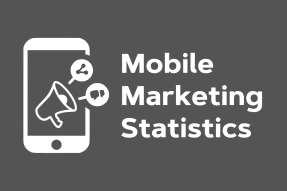

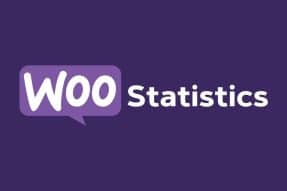



This Post Has 0 Comments